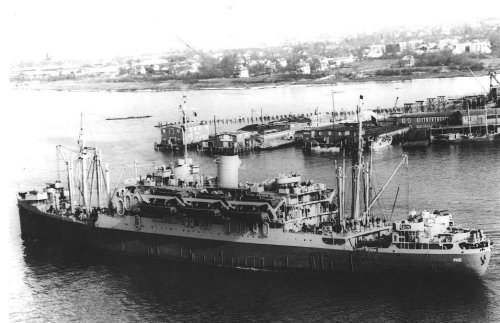
| No | Name | Yard No | Builder | Laid down | Launched | Comm | Fate |
| AP10, 2.1943- APA4 | McCawley (ex-Santa Barbara) | Furness, Haverton Hill, UK // Todd, Hoboken | 1928 | 1928 // 9.1940 | sunk 30.6.1943 | ||
| AP11, 2.1943- APA5 | Barnett (ex-Santa Clara) | Furness, Haverton Hill, UK // Todd, Hoboken | 1928 | 1928 // 9.1940 | stricken 5.1946 |
|
Displacement standard, t |
9304 - 9432 |
|
Displacement full, t |
14080 |
|
Length, m |
148.3 |
|
Breadth, m |
19.4 |
|
Draught, m |
7.90 |
|
No of shafts |
2 |
|
Machinery |
2 Busch-Sulzer diesels |
|
Power, h. p. |
8000 |
|
Max speed, kts |
14.5 |
|
Fuel, t |
diesel oil 4449 |
| Endurance, nm(kts) | 9000(12) |
|
Armament |
4 x 1 - 76/50 Mk 10.17, 4 x 1 - 12.7/90 |
| Military load |
22 LCVP, 2 - 4 LCM(3), 3991 t of cargo, 1650 - 1900 troops by 1945: 2 LCM(3), 23 LCVP, 1 LCPL, 1 LCPR, 1700t of cargo, 1382 marines |
|
Complement |
304 |
Project history: USN military transport vessels were sectioned into two groups: ÀÐ for transportation of troops and ÀÊ for carriage of goods and technics. The majority of them were built on the basis of standard types Ñ2, Ñ3 and Ñ4 and differed from usual cargo ships a little.
For delivery of troops and cargoes directly to a beaching place assault landing transport ships (ÀÐÀ and ÀÊÀ) served, which main difference from ÀÊ and ÀÐ consisted that they were extra equipped with disembarkation craft of LCVP, LCM and LCP (L) types; with their help delivery of people and cargoes to beach also was effected.
Originally similar ships were not outlined in own subclass and were registered as ÀÐ and ÀÊ. In February, 1943 reorganisation was done and assault transports have received indexation ÀÐÀ and ÀÊÀ.
Two ships of Doyen class, projected even on the eve of war for landing operations in Caribbean basin, became the first American assault military transports. The overwhelming majority of remaining ÀÐÀ and ÀÊÀ has been converted from merchant cargo and cargo-passenger vessels or constructed in hulls of standard cargo vessels built by the big series in days of war. An exception were specially projected as assault transports Gilliam (ÀÐÀ) and Artemis (ÀÊÀ) classes.
Besides the large landing transport ships of ÀÐÀ and ÀÊÀ classes, small landing parties and subversive groups were landed by fast landing transports (APD) converted from become outdated Wickes and Clemson classes destroyers and destroyer escorts of Buckley and Rudderow classes.
McCawley class transports were former passenger liners of Grace Liners Co.
Modernizations: by 1945 Barnett was armed with
4 x 1 - 76/50 Mk 10.18, 2 x 2 - 40/56 Mk 1.2, 18 x 1 - 20/70 Mk 4, SC or SF or SL or SN or SO or SU radar1/1946: 4 x 1 - 76/50 Mk 20/21, 2 x 2 - 40/60 Mk 1, 18 x 1 - 20/70 Mk 10, SC or SF or SL or SN or SO or SU radar
Naval service: McCawley 30.6.1943 was badly damaged by Japanese aircraft at Rendova and later sunk by American MTB.

Barnett
© Ivan Gogin, 2014-15